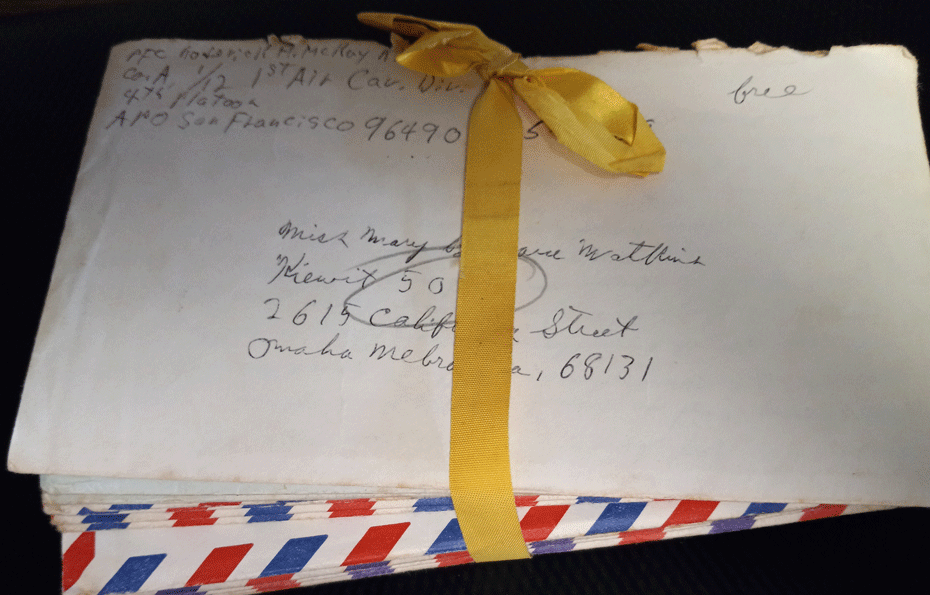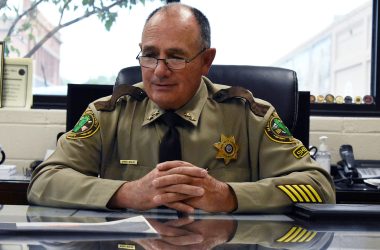VALE – The letters, stained with age and dirt from a war relegated to history, sat in a shoe box untouched for half a century.
They told of innocence. Of hope and the brutality of war.
When Mary Barbara McKay rediscovered the letters after the death of her husband Rod – a Malheur County native – she realized the scribbles between two young people in the late 1960s carried poignant power.
Rod survived the Vietnam War and died in 2018. The war wasn’t something he talked about very much, said Mary Barbara, who now lives in Kansas.
She felt the letters also reflected an ordinary man thrust into a brutal war of attrition, and she decided to publish them as a book. “Writings from Vietnam” came out in 2022, and is available on Amazon and at Barnes and Noble.
The book contains 13 letters as well as excerpts from missives Rod sent from basic and advanced training, Officer Candidate School and a journal he kept.
The letters spanned from May 3, 1969, to March 28, 1970. Rod returned home to the McKay Ranch on April 10, 1970.
The correspondence reveals Rod McKay’s change from combat rookie to veteran, as well as a change in his perception.
Mary Barbara Watkins didn’t pay much attention to the boys sitting on horses when she arrived at the McKay Ranch in June 1968.
Though she didn’t know it then, one of the boys atop a horse was destined to be her husband. At the time, though, she was there with her college friend, Rena McKay. Mary Barbara visited the McKay homestead at Rena’s invitation, once in 1967 and again a year later.
It didn’t take long for Rod and Mary Barbara to get acquainted, and from the start he made an impression on the young Catholic woman from Denver.
“I was just bowled over by Rod. We rode horses, moved cattle, rode in the hills, irrigated and at night after supper talked and talked,” said Mary Barbara.
Rod talked of working overseas in underdeveloped nations. He had just graduated with from the University of Portland and he had plans of serving to help humanity.
There was just one potential problem – Vietnam.
Without a college deferment, he was likely to be drafted. Instead, he enlisted in the Army in the summer of 1968, aiming to become an officer. After advancing to Officer Candidate School, however, he realized that wasn’t what he wanted. He dropped out and then was on the way to Vietnam, arriving in spring of 1969.
Dear Mary Barb,
Well, I’m here. I’m assigned to A Company, 1st Battalion, 12th Cavalry of the First Air Cavalry. They’re the ones with all the helicopters.
The Monsoon is starting and I hope to finish this before the daily deluge starts.
I’m really pretty lucky. My company just moved close to this base to prevent enemy rockets and mortar attacks. It’s supposed to be pretty good duty. Better yet, I’m not a pure rifleman like I thought I would be. I’m in a recoilless rifle squad. There are 3 of us . . .”
– May 16, 1969
So, began his first letter to Mary Barbara.
After a short time, Rod was assigned to be a radio operator in his company.
His early letters reflect adjustments to life in a war zone. In a June letter,, he talked about how “life isn’t too bad at all.”
Yet the tone of his letters began to change. In early July, Rod wrote he was “finding out that so much in this world is far from ideal.”
“It seems like we all feel we have to tell people back home how it is over here. I guess that’s because we were so misled ourselves,” he wrote.
Rod also wrote about “two Vietnams – the rear areas and the field. I am in the field and this is what it’s like: You carry 100 lbs. on your back. You get one hot meal every 3 days. You get clean clothes about once a week. You keep your boots on 24 hours a day except sometimes when I sleep alongside a fox hole I feel really brave, I take off my boots and my socks, rub mosquito repellent on my feet and lie back and go to sleep.”
In July, McKay wrote about meeting a soldier “from Vale, Oregon.”
“He saw ‘Oregon’ on my helmet and asked where I was from. It turned out he worked in Harper and said he knew Dad,” wrote McKay.
The man was Delos Buxton, who was killed not long after that. He was later awarded a Silver Star.
Rod also mentioned Buxton in a letter to his family in Harper. That letter was later published on the front page of the Aug. 6, 1969, edition of the Malheur Enterprise.
In August, Rod wrote Mary Barbara about the cost of war and its unpredictability, in one instance describing the gruesome death of a young soldier killed in a mortar attack.
He also described a letter American troops found on the body of a North Vietnamese soldier, addressed to his girlfriend.
“Our interpreter read it and said that it just told her how he missed her, etc., nothing about the war or what he was doing,” Rod wrote.
He said perhaps he should write letters like that.
“But I always feel the need to communicate the happenings over here to the people at home. I guess that’s partly because when you read the paper at home or even these Army papers over here you read lies,” he wrote.
He wrote about the absurdity of the Army’s body count doctrine and “exaggerated kill ratios.” In November 1969, Rod was pulled out of the jungle to work as a company clerk in the 1st Battalion’s rear area.
“I have a nice soft rear job,” he wrote in November 1969:
“The day before I left the field I was looking at a dead enemy soldier our men had killed the previous day. He was lying there on his back and was covered with flies, but in the middle of the flies was a little yellow butterfly – a little butterfly amongst the stench and flies. It seemed to me the butterfly was a very, very hard to distinguish ray of light in a very dark abyss. The butterfly is one prayer, one man who wonders and questions, yes one little bit of decency in a very indecent situation.”
In April 1970, Rod returned home to Harper. “Thanks for being what you were to me for the past two years and especially for the past 11 months,” he wrote his future wife.
“We are going along different roads, doing different things, but we have received lot help from each other. Right now, my future is a little unclear and I have a lot of contacts to make in the next month, so say a prayer or two for me, please. Also, thanks for the payers over the past year, they must have done some good.”
The two continued to correspond. Rod went to work at Ore-Ida in Ontario and then got his private pilot’s license, a first step to an eventual career as a commercial pilot.
In 1971, he moved to Wisconsin to be with Mary Barbara.
They married, had three children, and lived in California before settling on a farm in Pleasanton, Kansas.
The book was one way to pay tribute to her husband, she said.
“It shows a man who went to war and came back still a good person,” said Mary Barbara.
News tip? Contact reporter Pat Caldwell at [email protected].
HOW TO SUBSCRIBE – The Malheur Enterprise delivers quality local journalism – fair and accurate. You can read it any hour, any day with a digital subscription. Read it on your phone, your Tablet, your home computer. Click subscribe – $7.50 a month.




